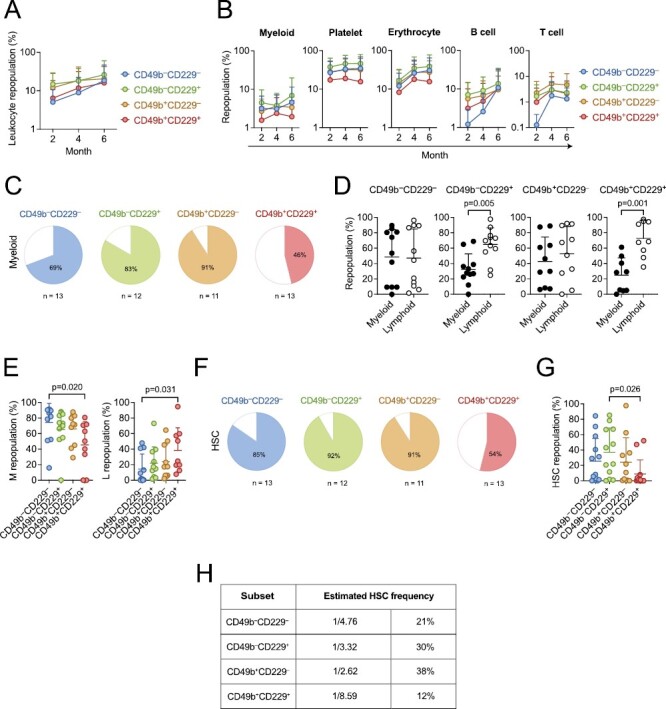Figure 2.

CD49b and CD229 subfractionate the phenotypic HSC compartment into functional HSCs and MPPs with short-term activity. (A) Leukocyte repopulation in the peripheral blood (PB) of mice transplanted with 5 cells from CD49b–CD229–, CD49b–CD229+, CD49b+CD229–, and CD49b+CD229+ populations. (B) Donor-derived myeloid, platelet, erythrocyte, B cell, and T-cell frequency in the PB of mice transplanted with 5 cells from CD49b–CD229–, CD49b–CD229+, CD49b+CD229–, and CD49b+CD229+ populations. (C) Proportion of transplanted mice with ≥0.1% donor-derived myeloid cells in the PB, 6 months post-transplantation. (D) Relative myeloid and lymphoid (B, T, and natural killer cells) repopulation of reconstituted mice in the PB. Mice are selected based on ≥0.1% donor leukocyte (CD45.2+) reconstitution in the PB, 6 months post-transplantation. (E) Relative donor-derived myeloid (M, left) and lymphoid (L, right) frequency (L: B, T, and natural killer cells) of reconstituted mice in the BM. Mice are selected based on ≥0.1% donor leukocyte (CD45.2+) reconstitution in the BM, 6 months post-transplantation. (F) Proportion of transplanted mice with phenotypic HSC reconstitution. (G) Donor-derived HSC (lineage−Sca-1+c-kit+Flt-3–CD48–CD150+) frequency in the BM of primary transplanted animals. (H) Estimated HSC frequency based on limiting dilution calculation using the number of mice positively reconstituted in PB myeloid cells, 6 months post-transplantation. nCD49b–CD229– = 13 mice, nCD49b–CD229+ = 12 mice, nCD49b+CD229– = 11 mice, and nCD49b+CD229+ = 13 mice, 2 experiments, in (A-C, F-G). nCD49b–CD229– = 11, nCD49b–CD229+ = 11, nCD49b+CD229– = 10, and nCD49b+CD229+ = 9, 2 experiments, in (D-E). Data are represented as mean ± SD in (A-B, D-E, G). Statistical analysis was performed using the Kruskal Wallis test with Dunn’s multiple comparison test in (A-B and E, G) and the Mann-Whitney test in (D). Abbreviations: M: myeloid; L: lymphoid; HSC: hematopoietic stem cell.
